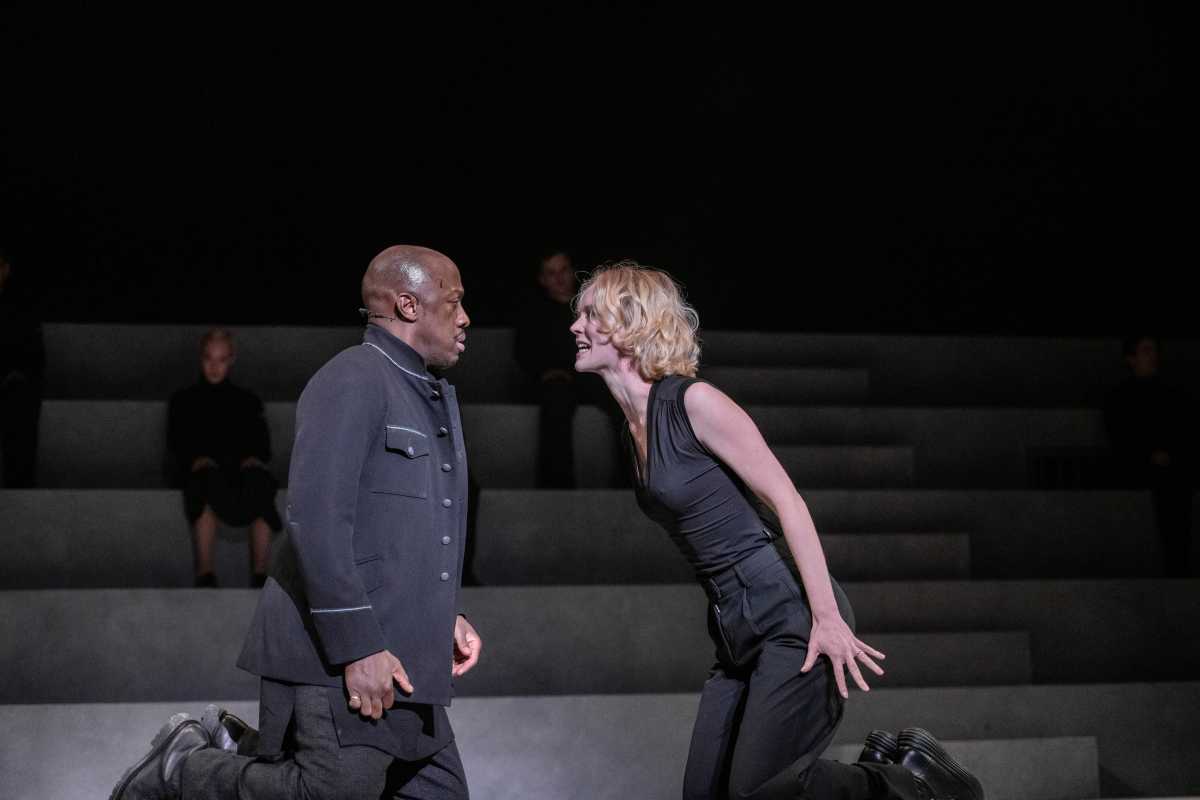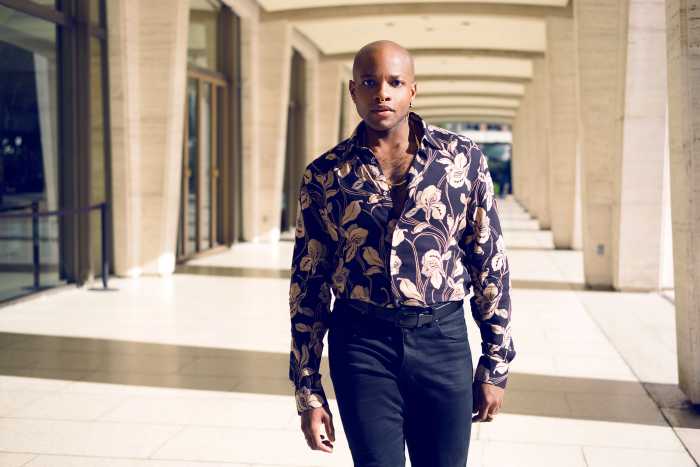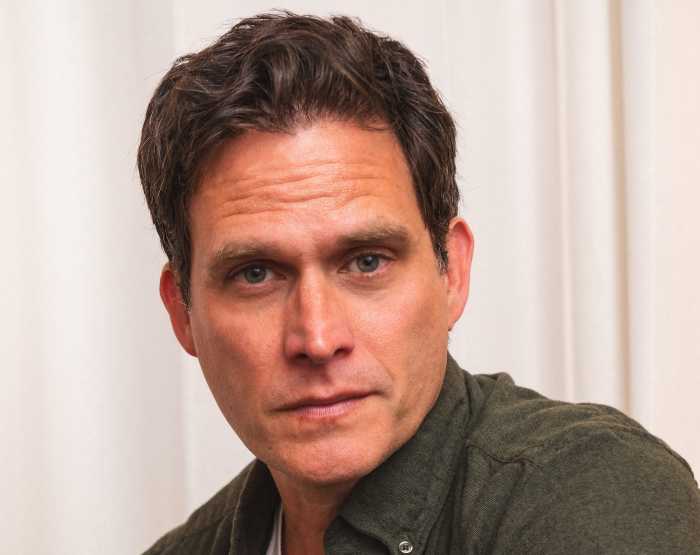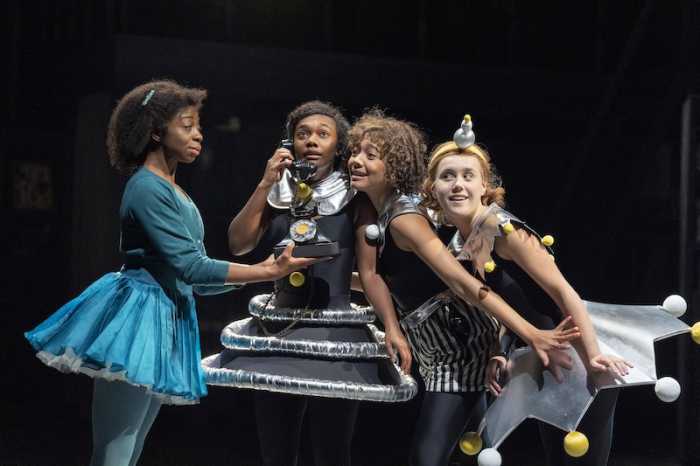When last in London this summer, it was in the 90s every day (record heat) without a drop of rain, the earth was scorched, Boris Johnson had resigned as Prime Minister but was squatting at 10 Downing St., Elizabeth II was queen as she had always been, and there was hope that Harry and William would reconcile. I returned for the Yuletide to a winter of discontent (and rain every day) after an almost comical turnover of three prime ministers, the end of the second Elizabethan Age, and the succession of a king vexed by an angry second son in a land roiled by strikes and Brexit disruptions. But theater — London’s greatest export — is thriving again as a source of distraction, challenge, and illumination.
The highlights for me were a muscular “Othello,” a rare revival of Lillian Hellman’s anti-fascist melodrama “Watch on the Rhine,” and a new adaptation of Virginia Woolf’s gender-bending “Orlando” that is making a stage star out of Emma Corrin, who is non-binary.
The “Othello,” directed by Clint Dyer at the National Theatre’s Lyttelton, stars an explosive Giles Terera as the Moor, Rosy McEwen as an athletic and feisty Desdemona, and an oily Paul Hilton (EM Forster in “The Inheritance”) as the wicked Iago. The racism in the supposedly open city of Venice is palpable here and Othello gets ground up in it, pulling almost everyone else down with him. But it is almost three hours of great Shakespeare that the National can be counted on to do transcendently. It is closing January 21, but coming to NT Live on May 11 at NYU Skirball and other cinemas in the United States.
At the small Dorfman house there, playwright April de Angelis, who did so well in dramatizing “My Brilliant Friend” for the stage, took a chance on the small story of “Kerry Jackson,” a conservative entrepreneur trying to make a go of a tapas restaurant in a liberal London neighborhood and clashing with the locals.
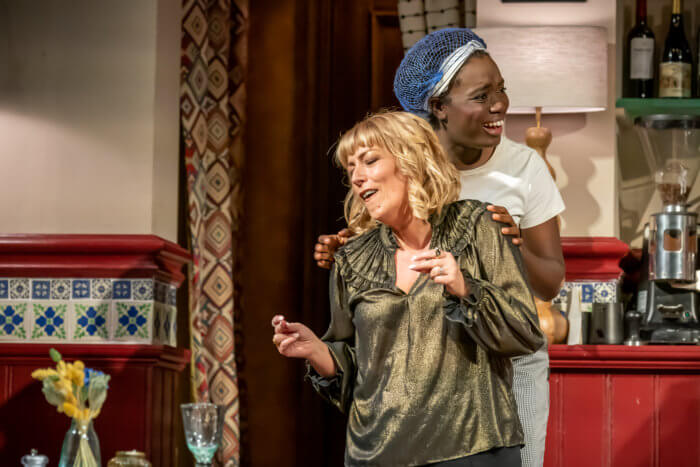
This play got thumped on by a lot of critics, but the audience is loving Fay Ripley’s performance and at least it doesn’t patronize our liberal sensibilities. More plays that tackle the cultural divide like this are to be encouraged. It runs until January 28.
The artistic director of the National, Rufus Norris — on a roll in recent years — mounted “Hex” with a book by Tanya Ronder, music by Jim Fortune, and lyrics by Norris: a dark and wild musical version of “Sleeping Beauty” full of fairies and child-eating ogres, male and female. The spectacular show fills the stage of the big Olivier house with humor, wonder, rock music, and a troubling tale. Queenie (formidable Victoria Hamilton-Barritt) the mother of Prince Bert (Michael Elcock) who courts awakened Princess Rose (Rosie Graham), is a conflicted ogre who sings “I Know What I Am,” an echo of the drag queen/gay anthem “I Am What I Am” from “La Cage Aux Folles.”
We’re a long way from the Disney version, but this enchanted production is worth a visit. It is now closed but may become a holiday tradition in a town that embraces panto and adult fairy tales at Yuletide.
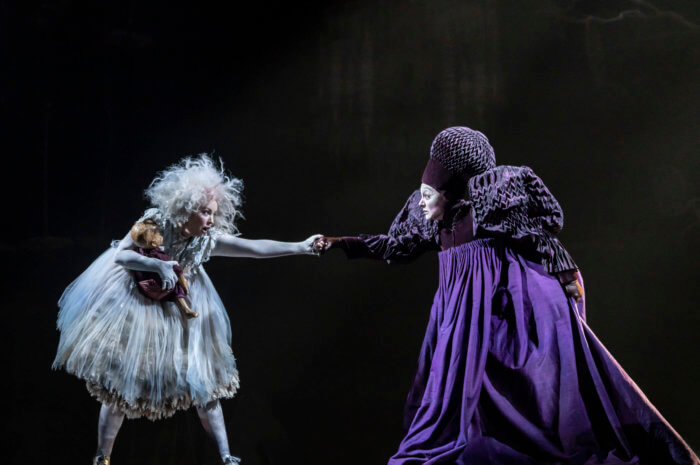
Let’s talk about two likely to come to the US.
“The Best of Enemies” at the Noël Coward Theatre (to Feb. 18) is James Graham’s dramatization of the 1968 national political convention TV commentaries by conservative dragon William F. Buckley, Jr. and liberal lion Gore Vidal during ABC-TV’s coverage in Miami and Chicago. Much is made that as high-minded as these clashes were supposed to be, they descended into name-calling — Gore labeling Bill a “crypto-Nazi” and Bill responding by calling Gore a “queer” on live TV. Graham, who has written some ripping political plays such as “This House” that made the hung UK parliament of the 1970s entertaining, seems to be saying that civic discourse went downhill from there to the Fox News of today. But there have been examples of it breaking down for centuries.
The play has gotten great reviews. But as someone who lived through that era, and was very familiar with the principals, I was put off by how little the actors captured their personalities. It’s fine, of course, casting a Black actor, David Harewood, as the right-wing, anti-Civil Rights Buckley but as good an actor as he is, he captured little of Bill’s eccentricity and fruitiness. And while out actor Zachary Quinto is better as Vidal, you won’t come away appreciating how really maniacal he could be. Or maybe the lives of these public intellectuals behind the scenes are just not all that compelling.
Others portrayed include James Baldwin, CBS’ Walter Cronkite, ABC’s Howard K. Smith, and NBC’s Huntley and Brinkley. And while I wasn’t expecting impersonations of these famous men, I was hoping that they would convey more of their singularity. The best scenes are the recreations of the on-air debates which are verbatim.
“Orlando” at the Garrick Theatre (to Feb. 25) is an adaptation by out playwright Neil Bartlett of Virginia Woolf’s 1928 novel about a young man at the court of Elizabeth I who we see over 400 years, waking up as a woman (and all that means for a person’s status) in the reign of Charles II and stays one into the 20th century.
Directed by Michael Grandage, there are EIGHT Virginia Woolfs serving as an enlightening chorus for this tale — men and women “and everyone else” playing her.
We know Emma Corrin for breakout turns as Diana in TV’s “The Crown” and the new film of “Lady Chatterly’s Lover,” but this role as Orlando gives them a chance to establish themselves as a major stage actor. They are also hilariously supported by Deborah Findlay as Orlando’s housekeeper over the centuries.
In all its theatricality, this show is a much different experience from Sally Potter’s fine 1992 film of “Orlando” starring Tilda Swinton in the title role and Quentin Crisp as the Virgin Queen. And it could not be more timely with the UK’s Sunak government taking unprecedented steps to overrule the Scottish parliament’s new Gender Recognition Act that makes it easier for a person to change their gender.
Woolf wrote “Orlando” as a love letter to Vita Sackville-West. This show extends that love to a modern world where so many rebel against the flexibility of gender and are in need of a better understanding of the complexity of being a human being.
Lillian Hellman’s 1941 “Watch on the Rhine” at the Donmar Warehouse (to Feb. 4) is also a still-timely play on family and geopolitical issues as a suburban Washington home is roiled by the return after 20 years of daughter Sara Muller (Caitlin Fitzgerald) with her three young children and husband Kurt (searingly played by German actor Mark Waschke), who is taking a short break from the German resistance to Hitler. The presence of a Nazi-sympathizing European guest (John Light) in the household thickens the plot exponentially.
The house is presided over by Fanny Farrelly (Patricia Hodge), the widow of a DC mover-and-shaker, played with acerbity, compassion, and ultimately steel. There’s a 1943 movie of the play that pops up on TCM from time to time with Bette Davis as Sara and Paul Lukas as Kurt. But this fine revival, directed by Ellen McDougall with an excellent supporting cast in the intimate Donmar, thrusts us in to the debate about evil in the world and what our obligations are to oppose it.
NOTE: Agatha Christie’s “The Mousetrap,” running in the West End since 1952, is finally coming to Broadway in 2023 along with the mantle clock from the original set. I broke down and saw it about 10 years ago and understood why it is such a durable mystery. For Broadway audiences, a chance to rewind the clock to a simpler time. We’re asked at the curtain not to reveal whodunit and even in the Internet Age the secret endures.
COMING UP in London: revival of the Tony-winning “The Lehman Trilogy” at the Gillian Lynne Theatre (Jan 24-May 20); the UK premier of Jordan Harrison’s “Marjorie Prime” starring Anne Reid at the Menier Chocolate Factory (Mar 3-May 6); “Phaedra,” a new play by Simon Stone after Euripedes, Seneca, and Racine at the Lyttelton starring Janet McTeer (Feb 1-Apr 8); Brian Friel’s “Dancing at Lughnasa” at the Olivier (Apr 6-May 27).

